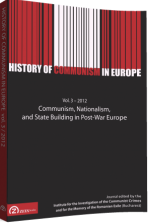The Paradoxes of European Postwar
The Paradoxes of European Postwar
Author(s): Bogdan C. IacobSubject(s): Politics / Political Sciences
Published by: Zeta Books
Keywords: Argument; Ideology;
Summary/Abstract: In 1945, at a time when the future of postwar Romania seemed yet to be decided despite the rapid advancement along the path of people's democracy, journalist Ion Biberi interviewed several cultural personalities about their present expectations and future projections. Among them, Petru Comarnescu, an eminent theater critic, one of the few Romanian intellectuals, then, with an academic degree at a North American university, and a convinced democrat, emphatically concluded his conversation with Biberi: “the beginnings of a truly new world dawn before us. We will surely not get to experience it in its full splendor. […] It will not be a monotonous and boring world as the bourgeois imagined it. But its diversity will provide us with a unity of humanness and energetic productivity that has never been witness before in history.”1 Comarnescu at the time was forty-year old. Once the communist party took over power completely, he will not be able to publish for almost a decade. By 1960s, though, he will be rehabilitated and allowed to make public his studies in cultural history.
Journal: History of Communism in Europe
- Issue Year: 2012
- Issue No: 3
- Page Range: 7-20
- Page Count: 14
- Language: English
- Content File-PDF

